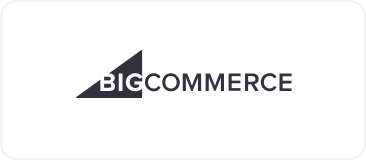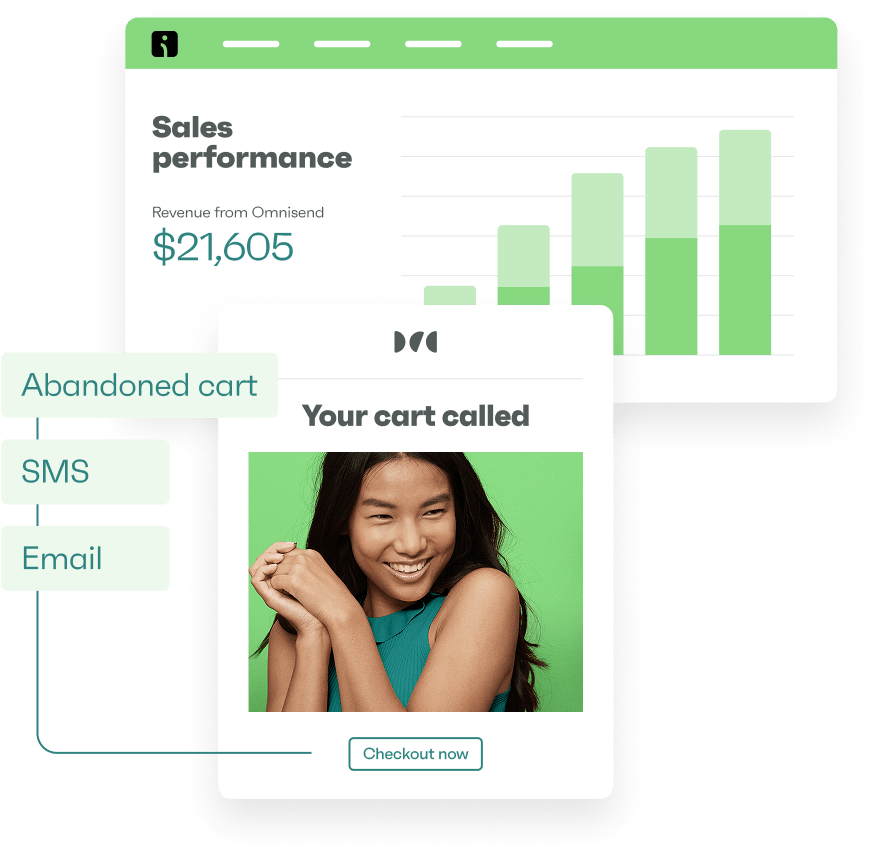Drive sales on autopilot with ecommerce-focused features
See FeaturesRead summarized version with
All the most successful ecommerce stores have one thing in common: they use digital marketing platforms to drive targeted traffic, build great customer experiences, and increase conversions — and you can do the same.
The best digital marketing tools are easy to learn, make workflows as simple as possible, and solve your biggest marketing challenges.
For instance, if you need to build your contact list, a top email marketing platform like Omnisend offers user-friendly signup forms, seamless contact imports, and tools to capture subscriber information during purchase.
Likewise, if your website struggles to rank in Google, a top SEO platform like Ahrefs can audit your site for technical issues that may impact search performance.
Join us below to discover the 10 best digital marketing platforms in 2025 and empower every stage of your digital marketing strategy.
Quick sign up | No credit card required
1. Omnisend
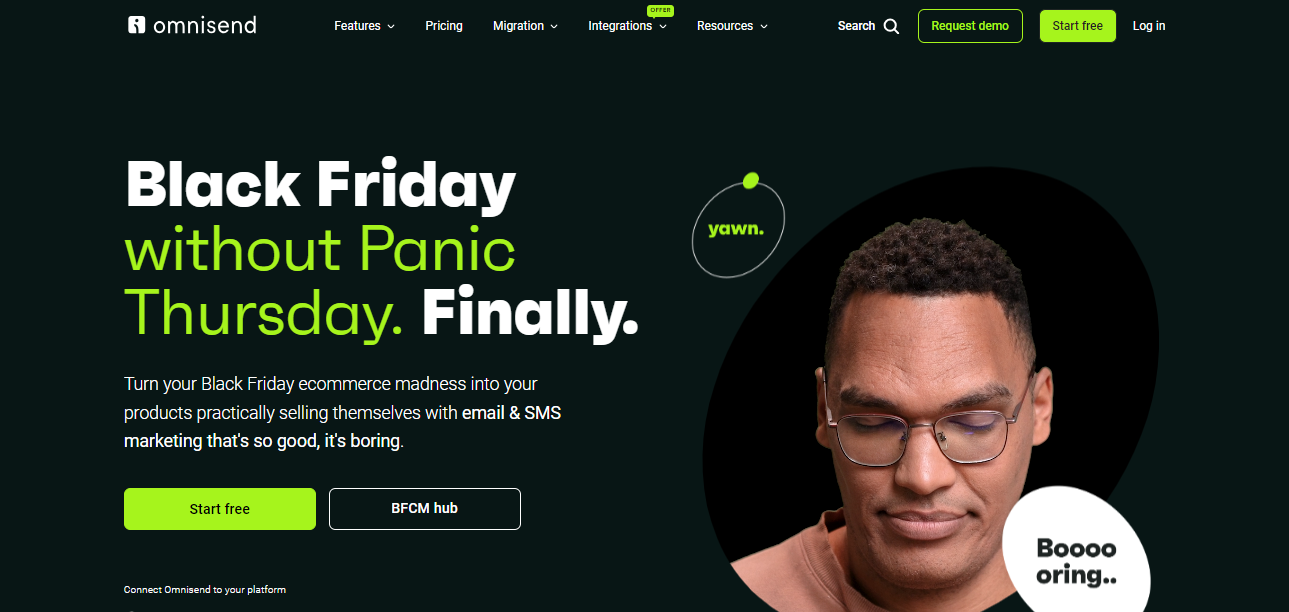
Omnisend is an ecommerce marketing automation platform for email, SMS, and push notifications. It offers customizable templates, automations, segmentation, and analytics to boost your online revenue through targeted campaigns.
Features
Omnisend’s customizable templates and intuitive drag-and-drop editor let you build professional emails, popups, and landing pages for your email marketing campaigns.
You’ll save time with pre-built automation workflows that drive sales on autopilot, from welcome series to abandoned cart recovery.
A/B testing helps you refine your messaging, and advanced segmentation lets you target and filter your audience based on various transactional events and purchase behaviors to increase engagement and conversion rates.
You can also grow your contact list using clever list-building tools like popups, the Wheel of Fortune, and multi-step forms for greater reach in your email marketing campaigns.
Shopify, WooCommerce, BigCommerce, Wix, and many other ecommerce platforms have apps for one-click Omnisend integration. Plus, Omnisend has over 100 integrations, such as Buy with Prime, to enhance your customer experience.
Pros
- Generous free plan with most premium features
- Omnichannel marketing for email, SMS, and pushes
- Pre-built automations
- Builds your contact list with multiple tools
- Segments your customers for better targeting
- Tracks open rates, clicks, sales, and more with analytics
Cons
- Limited flexibility for non-ecommerce brands
Pricing
- Free: Offers all features except 24/7 priority support and advanced reporting
- Standard: From $16/month with 500 contacts, 6,000 emails, and unlimited web push notifications/month
- Pro: From $59/month with 2,500 contacts, unlimited emails, and unlimited web push notifications/month, plus advanced reporting that tracks aggregate performance data and lets you compare email and SMS campaigns
2. CallPage
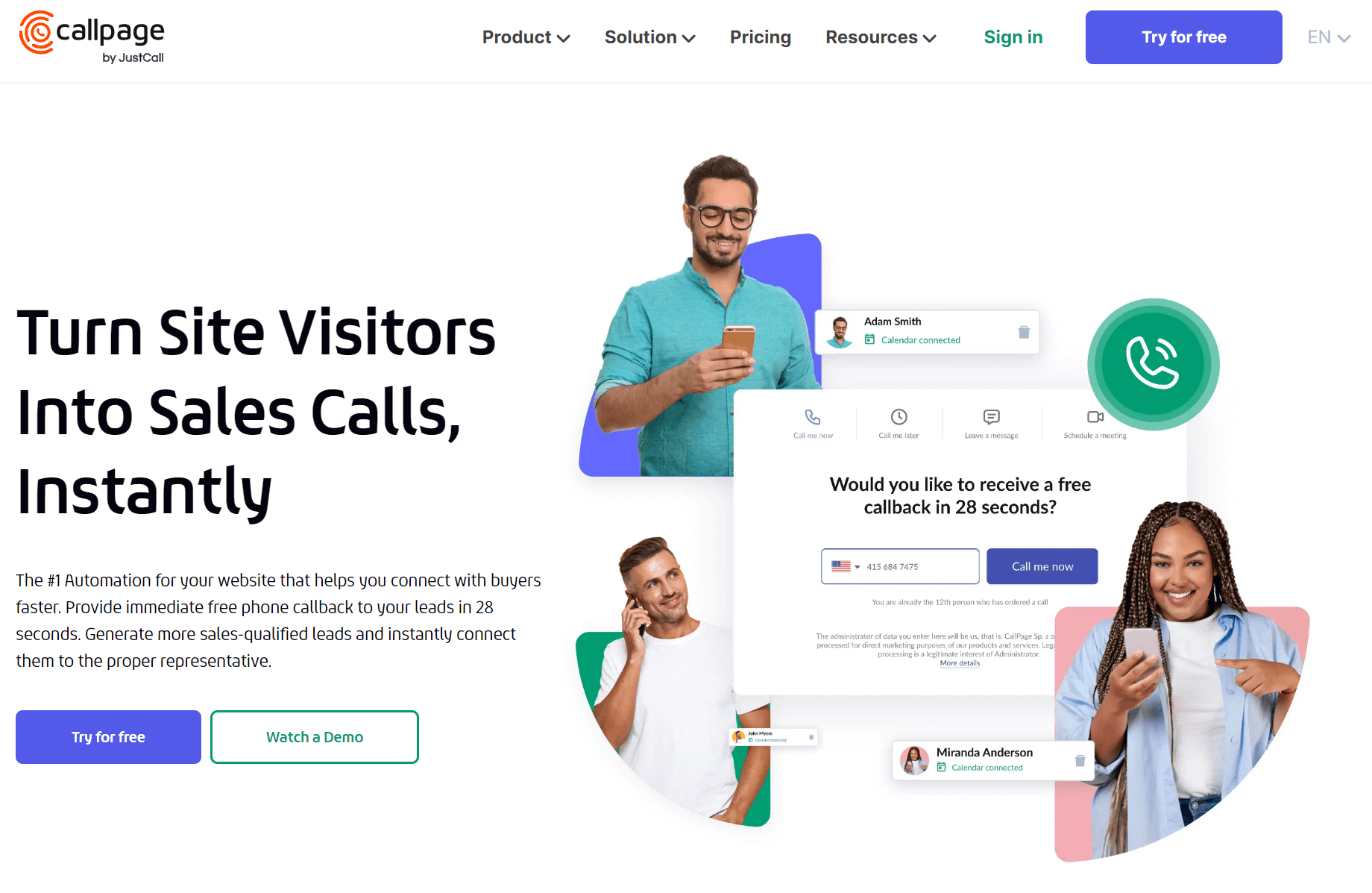
CallPage is a lead generation tool that offers instant phone callbacks to website visitors. It aims to convert site traffic into sales calls within 28 seconds to help you increase conversion rates, capture more qualified leads, and improve sales team efficiency.
Features
CallPage offers instant callbacks to website visitors, converting traffic into sales opportunities within 28 seconds of engagement.
Its customizable click-to-call widget and scoring rules will help you capture high-quality leads when visitor interest peaks, and the platform’s automated call routing ensures leads connect with the right representative.
You can use call recording for security and training purposes, and every interaction ties in with Google Analytics to provide valuable insights.
It also integrates with Zapier, connecting to over 7,000 applications for seamless data transfer and workflow automation.
Pros
- Instant callbacks
- Lead scoring systems
- Call tracking and recording
- Virtual PBX for call forwarding
- GDPR complaint
- Offers a compelling alternative to ticketing systems
Cons
- No built-in analytics (relies on Google Analytics)
- The cheapest plan doesn’t record calls or have SMS follow-ups
Pricing
- Essentials: $39/month for up to 50 calls/month and one operator
- Pro: $99/month for up to 100 calls/month and two operators
- Enterprise: Custom pricing for 600+ calls/month and a custom number of operators
The Essential plan offers a 14-day free trial.
3. Google Marketing Platform

Google Marketing Platform puts Google analytics, campaign management, tag management, and advertising across display, video, and search channels in one place to make managing your marketing activities on Google effortless.
Features
Google Marketing Platform centralizes campaign planning, buying, measurement, and optimization across channels.
For instance, Analytics 360 provides deep customer insights and website performance data to guide marketing strategies.
Campaign Manager 360 and Display & Video 360 streamline cross-channel advertising, helping you optimize media and creative performance.
Search Ads 360 provides real-time management of search campaigns across multiple platforms for improved results.
All these products work together in the Google Marketing Platform to provide a complete digital marketing experience with Google.
Pros
- Cross-channel campaign management and attribution modeling
- Seamless data sharing between products via the Integration Center
- Scalable solutions for businesses of different sizes (standard and 360 versions)
- Powerful programmatic advertising capabilities with Display & Video 360
Cons
- 360 versions of Google tools are very expensive
- It isn’t relevant if you use only one or two Google products
Pricing
Google Marketing Platform is free to use. However, some Google products, such as Analytics 360 and Search Ads 360, are paid tools.
4. Sprout Social
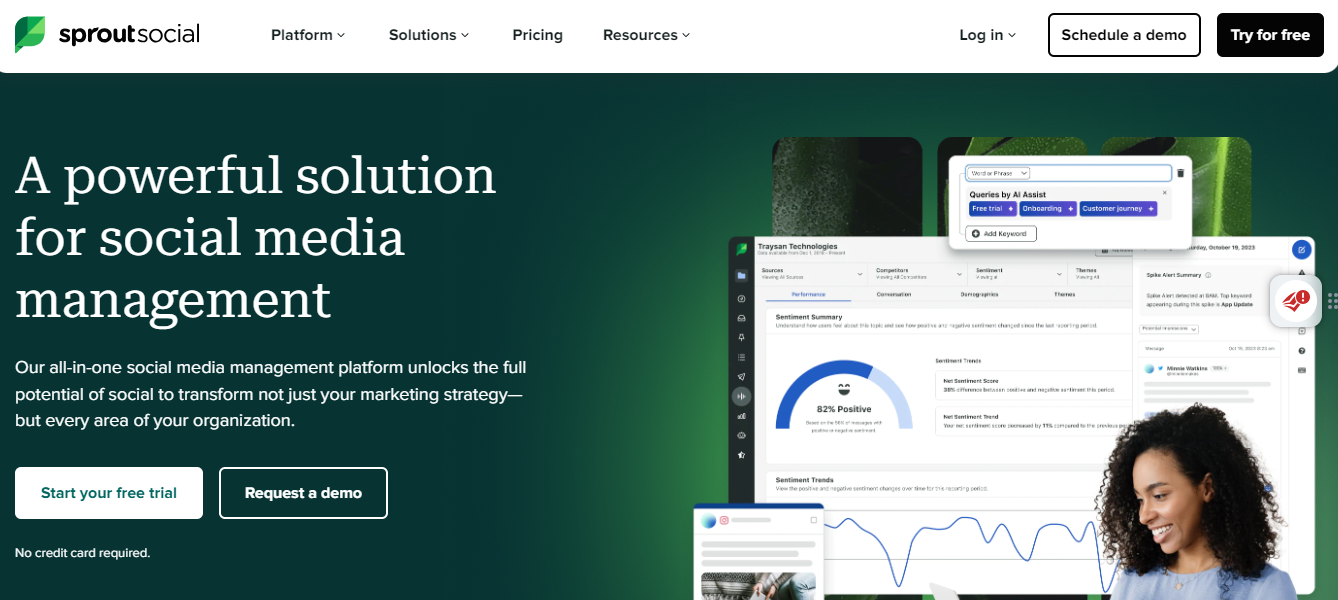
Sprout Social is one of the best digital marketing tools for social media engagement, publishing, analytics, listening, and influencer marketing. It can help you build social media strategies that drive revenue and improve customer relationships.
Features
Sprout Social’s unified inbox for all your social channels streamlines customer engagement with AI-enhanced replies and automated routing, while its publishing tools, including send time optimization, help you maintain a consistent social media presence.
It integrates seamlessly with major social networks like Facebook, Instagram, Twitter, LinkedIn, TikTok, and Pinterest to cover all your channels.
The platform’s analytics suite provides performance insights, complemented by social listening capabilities that monitor conversations and track sentiment across social media.
You can access influencer marketing and employee advocacy features to amplify brand messaging. These features are supported by AI-powered workflows that save time and improve decision-making.
Pros
- User-friendly interface
- Easy to set up
- In-depth analytics
- Uses AI to automate workflows
- Scalable for all businesses
Cons
- Expensive per seat pricing
- Some features have steep learning curves
- Only the Advanced plan has social listening, premium analytics, premium advocacy, and influencer marketing as standard
Pricing
- Standard: $249 per seat/month
- Professional: $399 per seat/month
- Advanced: $499 per seat/month
- Enterprise: Price on inquiry
You can sign up for a 30-day trial with access to all Standard features.
5. BigMailer
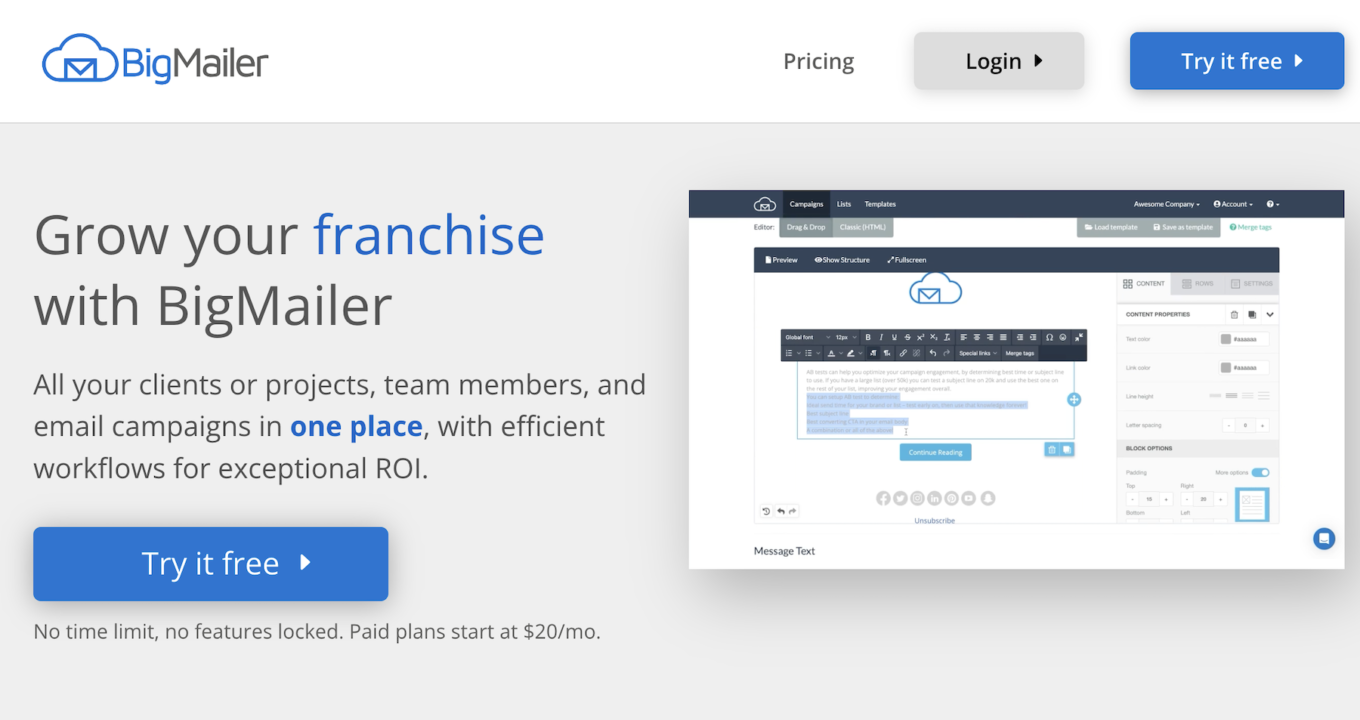
BigMailer is an email marketing platform with built-in sub-account management, ideal for marketing agencies and franchises. It offers role-based access and email template sharing, as well as advanced segmentation and reporting. Marketing agencies and email marketing consultants can white label email platform from BigMailer, to expand their revenue and improve client retention.
Features
BigMailer supports managing all your email marketing campaigns in one place – newsletters, automations (including RSS-to-email), and transactional – for a unified customer view.
BigMailer offers flexible templating options with Classic/HTML template editor, drag-n-drop builder, and pre-made template library. Its built-in email verification allows you to automatically remove invalid emails and some spam traps, without any extra work.
Experienced marketers can take advantage of BigMailer’s engagement by domain (aka mailbox provider) report, to analyze their campaigns beyond averages and optimize with more depth.
BigMailer’s template sharing between sub-accounts makes it one of the top email marketing platforms for franchises.
Pros
- Free plan without any features locked
- Support for all email campaign types – newsletters, automations, transactional
- Built-in email validation
- Flexible email template management
- Campaign engagement (open rates, clicks, bounces) by email domain (aka mailbox provider)
Cons
- No direct integrations with ecommerce platforms
Pricing
- Free: Offers all features except for white label option
- Business: From $20/month with 20,000 contacts and 240,000 emails. A connection to an Amazon SES is required on this plan
- Business Pro: From $50/month with 25,000 contacts and 250,000 emails. Sender domain verification via DNS records is required.
6. Microsoft Clarity
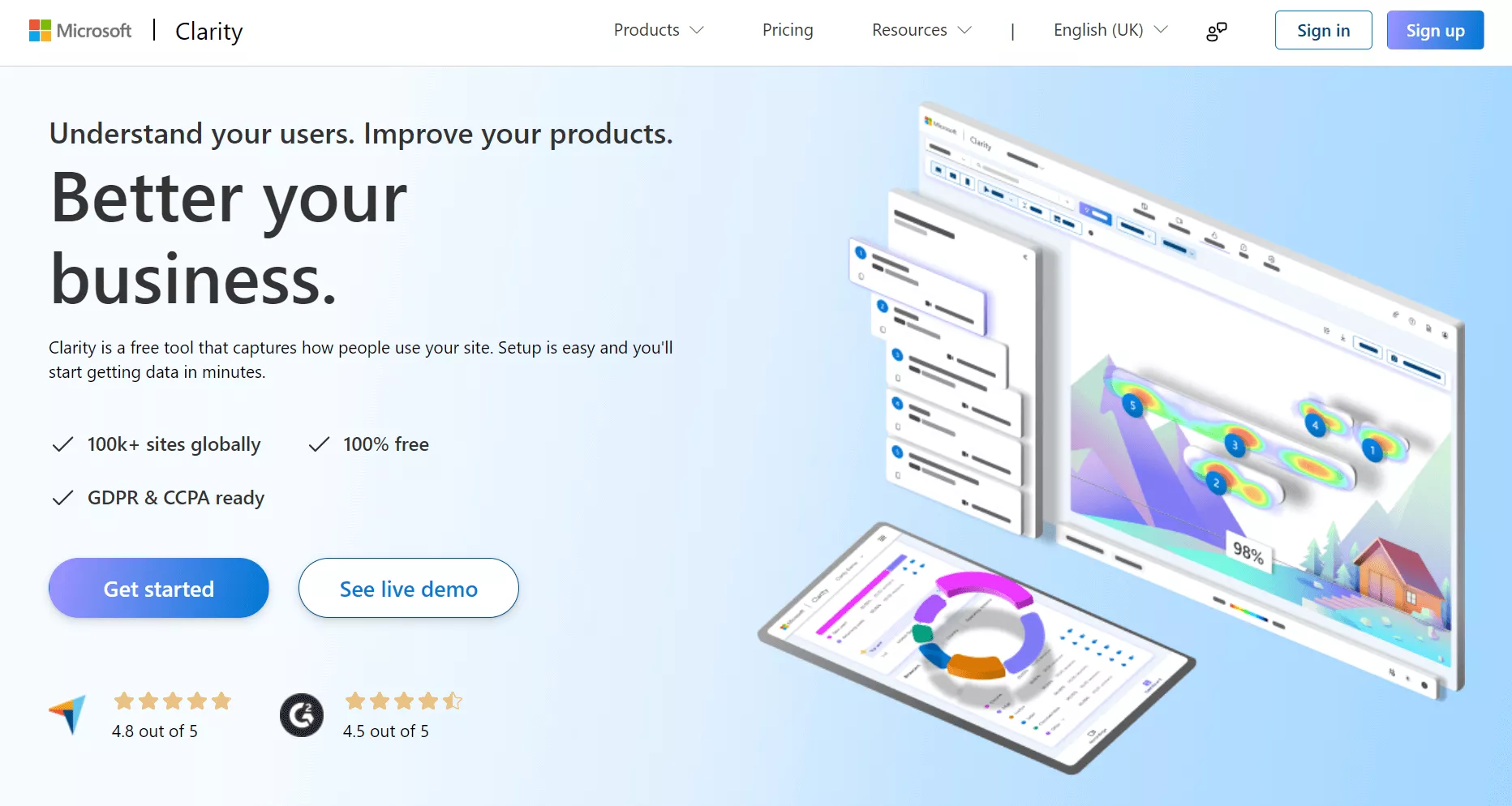
Microsoft Clarity is a free web analytics tool that offers heatmaps, session recordings, and user behavior insights. It can help you understand how users interact with your site and improve user experience and conversions.
Features
Microsoft Clarity generates heatmaps automatically for all pages on your site. These heatmaps reveal where users click, what they ignore, and how far they scroll, providing valuable insights into user engagement patterns.
Session recordings capture individual user journeys on your website, allowing you to observe user interactions and identify potential usability issues or areas for improvement.
Clarity integrates seamlessly with Google Analytics, allowing you to combine behavioral data with traditional web analytics to better understand your site’s performance.
The platform is designed with privacy in mind, adhering to GDPR and CCPA regulations to ensure user data is collected and processed in compliance with data protection standards.
Pros
- Free with no traffic limits
- Also available for mobile apps
- Uses AI to generate session takeaways
- Watch live users in action
- No impact on load times
- It starts generating data instantly
Cons
- Your users might have privacy concerns
Pricing
Microsoft Clarity is free for everyone. There are no paid plans.
7. Ahrefs

Ahrefs is a comprehensive SEO and digital marketing platform that offers tools for competitor analysis, keyword research, site auditing, rank tracking, and content optimization. It can improve your search engine visibility and online presence.
Features
With the Site Explorer feature, Ahrefs lets you study your website and your competitors’ websites. It analyzes backlinks, paid traffic performance, organic traffic performance, and website structure to help you assess your standing.
You can then go further in your analysis with Site Audit to reveal technical and on-page issues holding you back — things like broken links, 404 pages, indexability, slow load times, and missing H tags, to name a few.
Other helpful features include Content Explorer for finding content ideas and Keywords Explorer for finding and studying relevant keywords.
Pros
- Excellent technical auditing to catch issues
- Extensive graphs and data breakdowns
- Multiple reports with complete exports
- Batch analysis for up to 200 URLs in one run
- Rank tracking features your business and others
Cons
- Expensive across all tiers
- Steep learning curve
- It might be overkill for what you need
Pricing
- Lite: $129/month for five projects and one user
- Standard: $249/month for 20 projects and one user (up to five additional users at $60/month per user)
- Advanced: $449/month for 50 projects and one user (up to 10 additional users at $80/month per user)
- Enterprise: $14,990/month for 100 projects and three users (unlimited additional users are $1,000/year per user)
Ahrefs also offers some free SEO tools if those prices are too high.
8. Canva

Canva is a graphics and media publishing tool with over one million customizable templates for documents, logos, videos, social media posts, and more. Your ecommerce store can use it to create professional marketing materials with ease.
Features
Canva’s AI-powered tools let you create high-quality product images and videos while customizable templates streamline your social media and ad design process.
With the logo designer and Magic Resize feature, you can maintain brand consistency and effortlessly adapt designs across various platforms.
Create custom QR codes, edit PDFs, and use AI to produce professional-quality designs for your ecommerce business without extensive graphic design experience.
Your teams can collaborate, plan campaigns with the scheduler (Pro plan), and access a vast library of visual elements to enhance marketing materials.
Pros
- Drag-and-drop editor for all media
- Over one million templates
- Design and print in one place
- Social media sharing
- Real-time collaboration for teams
Cons
- Documents have Canva branding unless you upgrade
- Exporting print-ready CMYK designs only available from Pro
- The free plan limits access to templates
- The free plan has 5GB storage — a tiny amount for graphics-heavy media
Pricing
- Free plan available
- Canva Pro: $15/month or $120/year for one person
- Canva Teams: $10/month or $100/year per person
- Canva Enterprise: A custom plan with advanced security features like single sign-on (SSO) integrations
9. Google Search Console

Google Search Console is an official Google tool that tracks your website’s performance in Google search results. You can use it to monitor your impressions and clicks in Google and get insights into your best-performing pages.
Features
Search Analytics reveals user queries driving traffic to your site, allowing you to optimize content for better search performance and increased organic reach.
Sitemap submission ensures efficient crawling and indexing of your content, improving your site’s visibility in Google’s search results. Issue alerts help identify and fix problems quickly, improving site health to maintain a strong search presence.
URL Inspection provides detailed insights into how Google perceives your pages, helping you troubleshoot indexing issues and optimize page elements.
Performance reports track impressions, clicks, and rankings in search results, offering valuable data for refining your SEO strategy. Over time, the tool will collect enough data to provide Search Console insights, such as your most popular content in the last 28 days.
Pros
- Search performance data straight from Google
- Keeps SEO agencies honest
- Graphics and charts to visualize performance
- Catches indexing errors
- Filters to include or exclude a word or a phrase
Cons
- Setup isn’t always straightforward
- Steep learning curve
- It lacks real-time data
- It doesn’t show historical data (from before installation)
Pricing
Google Search Console is free for everyone.
10. Intercom

Intercom is an AI-first customer service platform offering instant support through AI agents, AI-assisted tools for human agents, and insights for improving customer service. It can be used to provide instant, 24/7 customer support.
Features
Intercom’s AI agent, Fin, can handle your basic and advanced customer support inquiries with an AI copilot to assist your support team.
Your ecommerce store can use Intercom’s customizable chatbot, help center, and knowledge base to provide self-service options. It also offers omnichannel support, including messaging, live chat, email, and phone integration.
Thanks to automation tools and a visual builder, creating workflows is easy. You can also track performance using reporting features, custom analytics, and AI insights.
Intercom’s App Store and developer APIs enable seamless integration with your existing marketing tools, like Slack, expanding the platform’s functionality for your ecommerce needs.
Pros
- Reduces support team workload
- Improves customer response times
- Enhances self-service capabilities
- Provides actionable performance insights
- Suitable for small and large support teams
Cons
- Steep learning curve
- Potential for overreliance on AI
- Some workflows lack customization capabilities
Pricing
Intercom prices its platform per seat. One seat gives one user complete access to Intercom’s features. The Advanced and Expert tiers offer 20 and 50 “Lite seats” per regular seat, providing limited collaboration access to additional users.
- Essential: $29 per seat/month
- Advanced: $86 per seat/month
- Expert: $132 per seat/month
Additionally, there’s a $0.99 fee/resolution with the Fin AI agent, and you can add Proactive Support Plus to any plan for $99/month.
How we tested digital marketing platforms
We set out to find tools that streamline digital marketing tasks and deliver measurable results for businesses of all sizes.
Our evaluation focused on ease of use, robust functionality, flexible pricing, and positive industry reputation.
- Usability: We assessed each platform’s interface and learning curve to ensure even the most non-technical among you can quickly use them
- Scalability: We looked at how well each platform can grow with your business without compromising performance or requiring significant changes
- Customer support: We evaluated the quality and availability of customer service, including response times, knowledge base resources, and support channels
- Integrations: For the tools that offer integrations, we looked at their ability to connect with other essential business tools, focusing on the number and ease of integrations
- Reports: We reviewed the reporting features of applicable tools to ensure you can quickly gain actionable insights from marketing data
- Pricing: We checked current prices and news for price updates to ensure minimal price changes over the last 12 months
The result of our testing is this list of the best digital marketing software for growing your business, balancing functionality, user-friendliness, and cost-effectiveness.
How to choose the best digital marketing platform
Start by identifying your most pressing challenges, such as lead generation or customer retention. Then, prioritize platforms that offer robust solutions for these specific pain points.
Comparing digital marketing tools will reveal multiple solutions for each workflow in your ecommerce journey. For instance, Omnisend competes with Campaign Monitor, Aweber, and many others in the email marketing space, each offering unique features and pricing structures.
The best marketing platforms will align with your goals, integrate smoothly, offer robust features, and fit your budget.
Follow this checklist to choose the right platform:
- Identify your main marketing channels and prioritize platforms that excel in those areas
- Evaluate the platform’s ease of use and ensure it aligns with your team’s technical skills
- Check for seamless integration capabilities with your existing online marketing software
- Assess the quality and accessibility of customer support to ensure help is available when needed
- Look for scalability to accommodate your business growth without needing to switch platforms later
- Compare pricing structures and ensure the platform offers good value for your specific requirements
Best digital marketing platform comparison
| Platform | Category | Standout feature | Pricing |
| Omnisend | Email marketing | Omnichannel marketing | Free plan available, paid plans from $16/month |
| CallPage | Sales calls | Automates callbacks | From $39/month |
| Google Marketing Platform | Unifies Google’s marketing suite | Free | |
| Sprout Social | Social media management | Send time optimization | From $249/month |
| Microsoft Clarity | Heatmaps | Records sessions | Free |
| Ahrefs | SEO (audits) | Fast and accurate site crawling | From $129/month |
| Twinword | SEO (keywords) | Group topics with AI | Free plan available, paid plans from $18/month |
| Google Search Console | Search visibility | Tracks your site’s presence in Google Search results | Free |
| Intercom | Customer service | AI chatbot | From $29/month |
| Canva | Graphic design | Over one million templates | Free plan available, paid plans from $15/month |
Quick sign up | No credit card required
TABLE OF CONTENTS
TABLE OF CONTENTS


No fluff, no spam, no corporate filler. Just a friendly letter, twice a month.
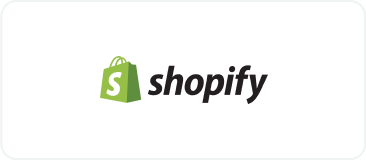
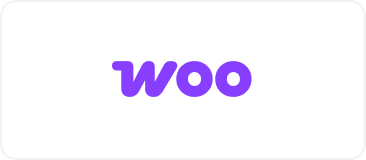 OFFER
OFFER


